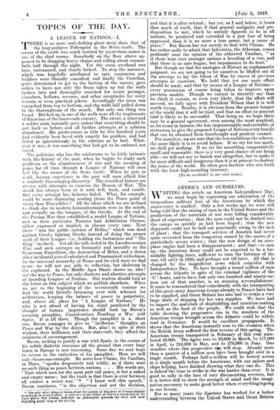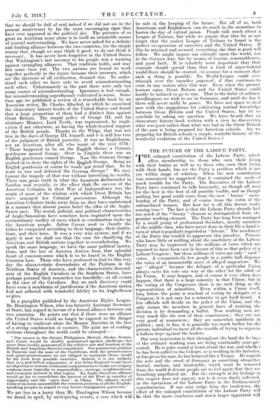AMERICA AND OURSELVES.
WRITING this article on American Independence Day, we must begin by expressing our admiration of the tremendous military feat of the Americans by which the anniversary is marked. Only a few weeks ago we were still being told that the raising of men in the United States and the production of the materials of war were falling considerably short of expectation ; that the men could not be drafted into the camps so quickly as had been hoped ; that the new shipyards could not be laid out punctually owing to the lack of plant ; that the transport services of America had never quite recovered from the congestion caused by the snows of a particularly severe winter ; that the new design of an aero- plane engine had been a disappointment ; and that—to sum up—the American Army could not be expected to be a for- midable fighting force, sufficient to turn the fortunes of the war, till ear:y iii 1920, and perhaps not till later. All that is changed by the magnificent news which coincides with Independence Day. To have brought a round million of men across the Atlantic in spite of the criminal vigilance of the U '-boats, and to have lost only two hundred and ninety-one men out of that number, is an amazing accomplishment. It must be remembered that coincidently with the transporting of this great army American troops already in France have had to be supplied, and Great Britain has also had to retain a very large share of shipping for her own supplies. We have had to import the materials of shipbuilding and munition-making as well as the food of the people. We could wish that the table showing the progressive rise in the numbers of the American troops brought across the Atlantic could be widely read in Germany. It would be excellent propaganda. It shows that the Americans instantly rose to the occasion when the British Army suffered the first reverse of this spring. The American troops transported in February of this year num- bered 48,000. The figure rose to 83,000 in March, to 117,000 in April, to 244,000 in May, and to 276,000 in June. One wonders where this progressive rise will stop. Already more than a quarter of a million men hive been brought over in a single month. Perhaps half-a-million will be ferried across in a single month before the Americans, with our sailors and ships helping, have finished showing what they can do. This is indeed the time to strike in the war harder than ever. It is good to rally in the face of very disconcerting reverses, but it is better still to show the strength of mind and the imagi- nation necessary to make good better when everything isgoing in our favour.
For so many years the Spectator has worked for a better understanding between the United States and Great Britain that we should be dull of soul indeed if we did not see in the present anniversary by far the most encouraging signs that have ever appeared in the political sky. The presence of so great an American army alone is in itself an inimitable means of mutual understanding. We have never asked for a definite and binding alliance between the two countries, for the simple reason that, though we may think it good, we do not think it necessary. It has never been forgotten in the United States that Washington's last message to his people was a warning against entangling alliances. That tradition holds, and may last some time yet. The two nations are bound to work together perfectly in the future because their interests, which are the interests of all civilization, demand this. To under- stand each other we have only to avoid misunderstanding each other. Unfortunately in the past there were only too many causes of misunderstanding. Ignorance is bad enough, but misunderstanding superfluously cultivated is worse. Some time ago we published a review of a remarkable book by an American writer, Mr. Charles Altschul, in which he examined the elementary history-books of the United. States and found that a large proportion of them had a distinct bias against Great Britain. The stupid policy of George III. and his obstinate Minister, Lord North, was represented, by impli- cation if not otherwise, as having the whole-hearted support of the British people. Thanks to the Whigs, that was not true in the days of George III. himself, and it is still less true of the judgment of British posterity. It was an Englishman, not an American, after all, who wrote of the year 1776: " There happened to be on the English throne a German gentleman named George. Over in Virginia there was an English gentleman named George. Now the German George started in to deny the rights of the English George. Being an English gentleman of course he would v9t stand that. So he went to war and defeated the German George." We may lament the tragedy of that war without lamenting its results. There was great truth in what the American Ambassador in London said recently, to the effect tha$ the success of the American Colonists in their War of Independence was the origin of most of the wisdom with which Great Britain has since managed her Colonial possessions. Although the American Colonists broke away from us, they have maintained in a manner that almost passes belief the ethos of the Anglo- Saxon race. The moral, judicial, and political characteristics of Anglo-Saxondom have somehow been imprinted upon the extraordinary medley of races which in combination make up the American people. Julius Caesar used to classify the tribes he conquered according to their language, their institu- tiorr3, and their laws. It was a very wise system, and if we apply it now we shall see that the case for classifying the American and British nations together is overwhelming. We speak the same language, we have the same political institu- tions, and the law of America derives from that splendid fount of common-sense which is to be found in the English Common Law. Those who have professed to find to this very day the characteristic descendants of the Puritans in the Northern States of America, and the characteristic descend- ants of the English Cavaliers in the Southern States, have perhaps pursued their researches too fancifully—at all events in the case of the Cavaliers. But no such discovery could have even a semblance of justification if the American nation had not adhered with wonderful fidelity to its Anglo-Saxon or:gins.
In a pamphlet published by the American Rights League, Mr. Huntington Wilson, who was formerly Assistant Secretary of State, has argued in favour of a formal alliance between our two countries. He points out that if there were an alliance the United States would no longer be exposed to the danger of having to vindicate alone the Monroe Doctrine in the face of a strong combination of enemies. The joint use of coaling- stations throughout the world could be arranged :— ." Our tenure in the distant Philippines, Hawaii, Alaska, Samoa, and Guam would be doubly guaranteed against challenge—far more than doubly guaranteed if the relative size and location of the British and American fleets beconsidered. Our paramount position in Panama and the zone of the Caribbean, with the protectorates and quasi-protectorates we are obliged to maintain there, would be far freer from possible anxieties. Indeed, it is not unlikely that in a post-bellunt adjustment of war debts England would have no objection to certain territorial readjustments to make sovereignty conform more logically to responsibility, strategy, neighbourhood, and economic interest in that region. An Anglo-American alliance would go far to consolidate the interest of the West in equality of opportunity and the open door' in China. The alliance would make even more unassailable the common position of all the English- speaking peoples in regard to any future immigration questions."
We are less in a hurry than Mr. Huntington Wilson because we dread to spoil, by anticipating events, a case which will be safe in the keeping of the future. But all of us, both Americans and Englishmen, can do much in the meantime to hasten the day of virtual union. People talk much about a League of Nations, but while we pursue that idea let us not forget that the easiest League of Nations to found is the perfect co-operation of ourselves and the United States. If this be attained and secured, everything else that is good will follow. We might impose our example upon the world, not in the German way, but by means of honour, reasonableness, and good faith. It is infinitely more important that that example should spread than that a kind of super-federal world-State should be created—to assume for a moment that such a thing is possible. No World-League could ever triumph over the cacoethes pugnandi, if that continues to exist in any nation after this war. Even when the present horrors came, Great Britain and the United States could hardly be induced to go to war. That is the habit of military unwillingness we wish to see in Germany, and until she has it there will never really be peace. We have not space to deal now with the suggestions for cultivating mutual knowledge between Great Britain and the United States, but let us conclude by asking one question. We have heard that an elementary history-book written with a view to discovering what was good rather than what was bad in the Great Britain of the past is being prepared for American schools. Are we preparing for British schools a simple, readable history of the wonderful evolution of the United States ?











































 Previous page
Previous page